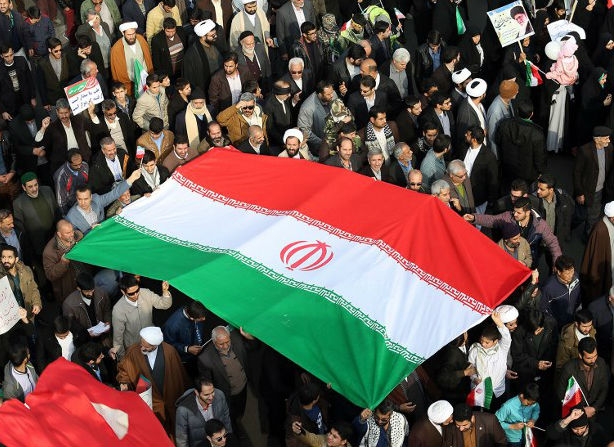Pro-government rallies expected in Tehran as US imposes sanctions

Pro-government rallies are expected in Tehran on Friday with authorities seeking to put the past week's unrest to bed, as Washington slapped fresh sanctions on Iran and called for an emergency UN Security Council meeting.
Iranian officials blamed a plot by the CIA, Israel and Saudi Arabia for the unrest that convulsed much of the country for five days - part of the increasing tensions playing out between Iran and its neighbours since President Donald Trump came to power.
Iranian officials announced 40 rallies across the province of Tehran after Friday prayers, building on huge pro-government marches seen in many other cities over the previous two days.
The US imposed sanctions against five Iranian firms alleged to have been working on an illegal ballistic missile programme, linking the move to the protests.
"These sanctions target key entities involved in Iran's ballistic missile programme, which the Iranian regime prioritises over the economic well-being of the Iranian people," US Treasury Secretary Steven Mnuchin said.
On the streets of Tehran, a heavy police presence lingered though there were no reports of fresh protests overnight.
There were some reports of small anti-government demonstrations in provincial towns, but these could not be verified.
A total of 21 people died and hundreds were arrested in five days of unrest that began on 28 December as protests over economic woes quickly turned against the government as a whole, with attacks on government buildings and police stations.
The UN Security Council was set to hold an emergency meeting on the issue later on Friday at the request of the US.
Russia criticised the US for calling the meeting and it remained unclear if other council members would try to block it through a procedural vote.
CIA plot
Chief prosecutor Mohamamd Jafar Montazeri blamed the unrest on a plot dating back four years by the US, Israel and Saudi Arabia.
"The main architect of this plan is Michael D'Andrea," Montazeri said, referring to the head of Iran's CIA desk who is nicknamed 'Ayatollah Mike'.
"They launched (social media) campaigns with the theme of 'no to high prices', 'no to paying bills'," he said, adding that the plan was to start unrest in the provinces before moving on Tehran.
Montazeri also claimed there were efforts to infiltrate the Islamic State group into the country.
Iran's political establishment has closed ranks against the unrest, with even reformists condemning the violence.
Nonetheless, many officials have recognised the genuine economic grievances of many Iranians, particularly a jobless rate at close to 30 percent for young people.
But many have also called on President Hassan Rouhani to address the economic issues that drove the initial protests and parliament has already moved to block unpopular budget measures announced last month, including fuel price hikes.
"The people's main demand now is for the government and officials to deal with the economic problems," Ali Akbar Velayati, an adviser to supreme leader Ayatollah Ali Khamenei, told the semi-official ISNA news agency on Thursday.
The head of the army, General Abdolrahim Mousavi, thanked security forces for "putting out the fire of sedition".
Interior Minister Abdolreza Rahmani Fazli said 42,000 people had taken part in the unrest nationwide.
It was higher than a previous figure of 15,000 given by the head of the Revolutionary Guards, but still far below the hundreds of thousands that took to the streets during the last major protest movement in 2009.
A US State Department spokeswoman said those killed and detained "will not be forgotten", after the White House warned it could impose sanctions on any officials it holds responsible.
US President Donald Trump has repeatedly tweeted his backing for the protesters, his most recent saying he has "such respect for the people of Iran as they try to take back their corrupt government".
Iranian Foreign Minister Mohammad Javad Zarif tweeted back: "Trump has an odd way of showing 'such respect'."
Nuclear waivers
"From labelling them a 'terrorist nation' and banning them from visiting the US, to petty insults on the name of the Persian Gulf," he wrote, referring to Trump's use of the term "Arabian Gulf".
Russia jumped to Iran's defence, with Deputy Foreign Minister Sergei Ryabkov telling state agency TASS: "Despite the many attempts to distort what is really going on (in Iran), I am sure that our neighbour, our friend, will overcome its current difficulties."
The question now is whether Trump will continue to waive nuclear-related sanctions suspended under the 2015 nuclear deal between Iran and world powers.
Under the deal, Trump must actively lift certain sanctions every few months and the next deadline falls on 12 January.
Iran - which has long accused the US and Sunni Arab rivals led by Saudi Arabia of interference in its affairs - said external "enemies" were behind recent unrest.
Rouhani came to power in 2013 promising to mend the economy and ease social tensions, but high living costs and unemployment have left many feeling that progress is too slow.
Rural areas, which have seen years of drought and under-investment, are particularly hard-hit, while the jobless rate is close to 30 percent for young people.
Stay informed with MEE's newsletters
Sign up to get the latest alerts, insights and analysis, starting with Turkey Unpacked
Middle East Eye delivers independent and unrivalled coverage and analysis of the Middle East, North Africa and beyond. To learn more about republishing this content and the associated fees, please fill out this form. More about MEE can be found here.




